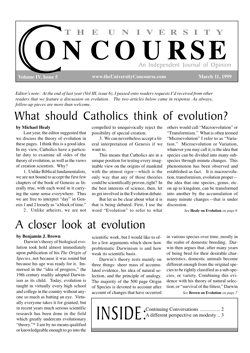Why non-liberal majors need a liberal core
by Susan C. Fischer
Regis Martin’s article on the value of great works of literature in the formation of the person stirred within me many long-standing questions and considerations regarding undergraduate education.
First of all I shall admit something it seems nearly a crime to admit: my bachelors degree is in science—specifically nursing. I say that with humor, as at times it seems majors outside of the liberal arts are viewed as flat, technical and lacking in depth. Majors such as accounting, economics, chemistry, business, computer science, education and my own dear little nursing are flung off as “less than” a full college education—relegated to the realm of utility and excluded from the world of beauty. They are also seen as incapable of attaining what Newman so aptly described as the end of education, Knowledge of the Whole. This view of the non-liberal arts programs has not come about without reason.
A student of the sciences or business deprived of courses in language, history, philosophy, music, art, literature and theology—in other words, a core curriculum—is left open to a formation of the intellect that perhaps leans towards mere utility and function.
As a five-time-expectant mother I have come across this sort of mal-formation in the hospital where I was sometimes “cared for” by nurses with a two-year technical degree. Such nurses tend to lack refinement; they often fail to recognize the person behind the technical duties they’re performing. They function as directed, without an understanding or a rationale behind their actions. The lack of education in human psychology, the lack of exposure to deep philosophical questions about personal existence and the dignity of man can cause them to act without sympathy. They just fling a hospital gown toward the helpless patient with a heartless: “Strip down and put this on, honey.”
It is not their fault. They were never taught otherwise. But they should have been.
Thankfully, FUS asks more of its nursing students. I can remember many times as an undergrad my classmates lamenting the effort of having to read Dante, and asking, how is this related to caring for sick people? But we see now that it is, for it is this reading, this opening of the mind to time-tested literature, this encounter with the great questions of ethics and theology, all within the milieu of a lively Catholic academic community, that produces the kind of nurses we wanted to be.
The FUS-educated nurse greets a patient by name, and uses direct eye contact. She speaks gently, exhibiting confidence and knowledge, and profound respect for the patient as person. Her reading of literature has given her insight beyond her own experience, so that despite her youth she might understand and empathize with patients of all ages from all economic backgrounds. She is not tired of learning, as her mind, now inflamed with Truth, longs for more. She is not deprived of the vision of the Whole even though much of her training was technical in nature. We do not send her out flatly educated with a view for the merely utilitarian. She may pursue excellence in her field, without missing out on the fullness that comes from “liberal” learning.
The same is true for students in the other professional programs. Exposure to a liberal arts core does nothing to diminish their technical training or capabilities, rather it enhances them and brings them into a circle of fullness and depth.
Education is the formation of the whole man, not merely the passing on of technological data and skills. Man can not be confined to such an arena. As John Paul II stated in his encyclical Faith and Reason, “all men and women…are in some sense philosophers and have their own philosophical conceptions with which they direct their lives. In one way or other, they shape a comprehensive vision and an answer to the question of life’s meaning; and in the light of this they interpret their own life’s course and regulate their behavior.”
If we deny this in man and attempt to confine him to the technical only, we do violence to his deepest nature.
I want to add my voice to those calling for a solid core curriculum for all of our majors. And I repeat Dr. Martin’s question:
“Is it too much to hope, I wonder, that here at Franciscan University we too might fashion a setting ...A place where intellect and soul, Athens and Jerusalem, exist amid a myriad of splendid tensions marking the life of a great University? If such is not a goal worth striving for, then what possible excuse have we for offering an education to those who come to us seeking wisdom and wholeness?”
Susan (Creel) Fischer, Class of ‘84
Susan C. Fischer is Assistant Editor of the Concourse and is currently on sabbatical from the MA Philosophy program to care for her fifth child.


